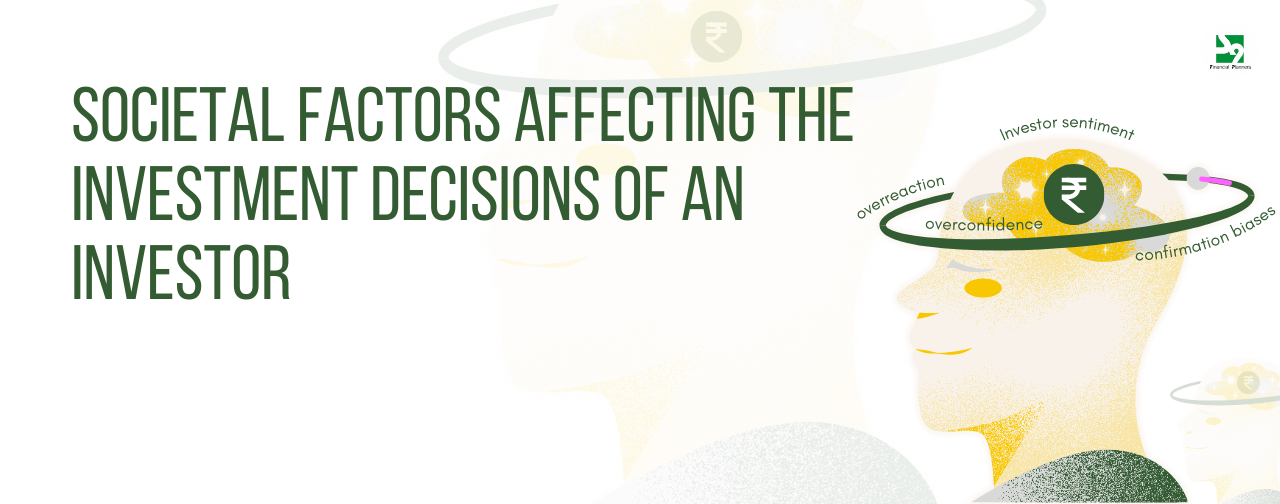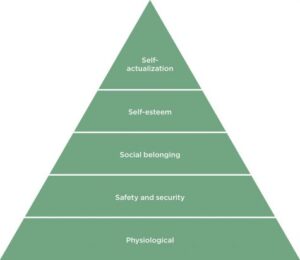Societal Factors affecting the Investment Decisions of an Investor
Mindset dictates our decisions and behavior towards investments. Globally many researchers and academicians are keen to know individual investors buying and spending behaviors. Several factors come into the picture when we try to evaluate an individual investor’s investment decisions.
Investment decision – a complex process
An investment decision is a complex process because one has many options to choose from and it’s very difficult to know which investment is right for them in particular.
What is my financial need? What are my expenses and income? Identifying financial goals? Filtering on different investment options suitable to our risk profile! The answer to these questions has a lot to do with how we think about ourselves and what beliefs we carry in our minds when it comes to investments. Most often it is observed that an investor might be largely influenced by the primary circle of the group they are in.
As per Maslow’s pyramid, there is a need for every human being to get accepted by society in many terms. But people keep forgetting that there is a thin line between accepting yourselves and doing all possible things to get accepted by society. This directly affects the decisions we take in different sectors of life. Considering finance as one of the main sectors, let’s see how different social factors affect the investment decision of investors.
Peer pressure
We tend to get inspired by others’ lifestyles and always feel the want to upgrade. There is no harm in it. But here I feel that we get carried away, we forget that something suitable for person A may not be suitable for person B. There are factors like herd mentality, fear of losing, or embarrassment instilled with a lot of predispositions.
For eg- If Mr.X’s income is Rs. 35,000 with a job profile of being a front desk executive with no family responsibilities and Mr.Y, a Manager with a salary of Rs.50,000 with the responsibility to take care of his family, both get influenced to upgrade for a better lifestyle and decides to buy a car.
While exploring options Mr.X is making decisions considering factors like choice, budget, and cash flow whereas Mr.Y makes decisions considering factors like status, EMI options, peer circles choices, etc.
In this case, both bought the car but the factors affecting their choices were completely different. One bought it with planning, the other bought it with impulse urges. Somewhere Mr.Y wanted that acceptance from society which comprises his friends and family circle.
This surely disturbs the overall cash flow of Mr.Y and affects his own financial plans. What do you think Mr.Y could have done instead in this case let us know in the comments!
Behavioral factor
Your behavior plays a major role in your finances. When I say behavioral factors here I am talking about factors such as Investor sentiment, overreaction, underreaction, confirmation biases, overconfidence, etc. Investment decisions are not significantly influenced by experience, but as one gains more experience, one tends to become less swayed by emotional factors.
Eg- In recent times stocks or IPO have taken a leap, where people are investing in stocks with the expectation to generate high returns in a short time but it is not always a jackpot like Avenue supermart or HDFC Asset Management Companies. Some can be like Paytm or Yes Bank. If a person registers for the IPO with a proper study of the stock and also reflects on the reason for buying this stock then the results would have not affected so much to the person making this choice. It is therefore advised to look into your risk appetite and accordingly take investment decisions.
Heuristic Factor
We humans are mostly looking for quick and simple solutions as mentally we want to run away from the cognitive load. The heuristic approach is nothing but thumb rules, which makes decision-making easier, especially when the environment is uncertain or complex.
For eg: When you start earning your parents insist on getting a LIC policy or Having some money parked in a fixed deposit or some may insist on even buying a house. For them it’s the thumb rule set by society, this is how it’s traditionally done. Now even though we can buy 1 BHK as per our cash flows. We at times think that if we are buying a house once, let’s opt for 2 BHK, and for the remaining amount we will take a loan or so. This kind of decision, this kind of financial pressure affects our long-term financial goals. A loan that wasn’t planned comes into the picture and disturbs other investments that were supposed to be made at that stage of life.
We constantly feel that we are judged by society, and we have to up our game in comparison with others to get accepted and respected by society. But to tell my fellow readers that it is not like we feel it. It is all about our perception of it. Taking undue pressure and changing our investment decisions due to it is not something we recommend doing. I suggest you stick to your financial plans and make them work in your favor and try to reflect on the factors that are personal to your circumstances.
There are many layers to the human brain and its behavior. If you want to get this covered do let us know In the comments we will surely try to cover more on it.

